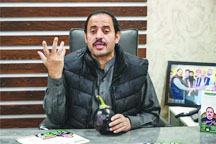Bottles, eggplants, beds: Pakistan politicians reclaim election symbols


BY SHROUQ TARIQ AFP: Aamir Mughal brandishes an eggplant before a gaggle of voters, rallying support behind the Pakistani staple during an election campaign that he says is being undermined by bizarre symbols assigned to candidates.
“The eggplant is now a famous symbol across all Pakistan,” declares the candidate for the capital Islamabad, a follower of jailed ex-prime minister Imran Khan. “Now this has become the king of the vegetables.”
In Pakistan – where literacy rates hover at just 60% – political parties use icons to identify their candidates on the campaign trail and ballot papers.
However, as a military-backed crackdown puts the squeeze on opposition parties, some candidates say the authorities are trying to hinder their campaigns by allotting them symbols that are either degrading or downright weird.
Khan has been barred from standing in Thursday’s poll and his Pakistan Tehreek-e-Insaf (PTI) party has been stripped of their long-time cricket bat emblem over failing to meet election commission rules.
Dozens of his followers are also not allowed to stand, and some of those on the ticket – now running as independents – have reported harassment or been forced into hiding.
Others have been assigned a random bric-a-brac of symbols and are scrabbling to make an impression on the campaign trail.
A spokesman for the Election Commission of Pakistan said the symbols are chosen from a list designed for independents and “are purely the prerogative of the returning officers”.
The humble eggplant – or baingan in Pakistan’s Urdu language – is a key ingredient in Pakistani cuisine.
It is also ripe with symbolic connotations, notably deployed as an emoji suggestive of male anatomy.
“The election commission assigned us this symbol to make a mockery of us,” said 46-year-old Mughal.
“We felt weird,” he coyly admits.
However, Mughal’s team have leaned into their fate.
An assistant trails the candidate with a sack of the purple produce. He carries it like a mascot and makes speeches against a backdrop of festooned aubergines.
When addressing voters he holds it aloft like Shakespeare’s Hamlet contemplating a skull.
Such is the popularity of their campaign, they claim the cost of eggplants has risen fourfold at grocers.
“This symbol is giving me an extraordinary fame,” said Mughal. “Everyone wants to look at it as they know the symbol belongs to Imran Khan’s candidate.”
Ejaz Gaddan romantically describes his constituency in the eastern Punjab province as his ancestral homeland – his people’s “final resting place”.
Perhaps fittingly, he was assigned a symbol of a bed.
“They tried to humiliate us with the symbols they are giving us. Some candidates feel embarrassed telling people what symbol they have gotten,” the 50-year-old Bahawalpur candidate complained. “This is not an election, this is cruelty.”
His symbol is a charpai – a simple wood-frame bed with a sprung surface of woven rope, commonly used in lower-income homes.
“It is a very useful household item. When we are alive, the charpai allows us to rest. When we die, it takes us on our final journey,” said Gaddan. “My symbol is already available in every household. I don’t have to introduce it to my constituents.”
The Pakistan Muslim League – Nawaz party, considered military-backed, is canvassing with the symbol of a fearsome big cat.
However, Gaddan is unfazed.
“The lion is a bloodthirsty beast,” he says. “There is no place in our society for a beast.”
In northwestern Pakistan, Shehryar Afridi was initially incensed when he was issued the symbol of a bottle.
In the local Pashto language, calling someone a bottle implies they are an “empty vessel” – vapid and thoughtless.
It also has connotations of alcohol consumption in the Khyber Pakhtunkhwa province where conservative Islam holds sway.
“Most of the PTI candidates, including myself, were given symbols that were meant to create a negative bias,” said the 45-year-old candidate for Kohat city. “We were deliberately given symbols that could be used to ridicule us.”
Afridi took his case to the high court in the provincial capital Peshawar, but won no relief.
“When we entered the field during the election campaign, we received so much backlash regarding the bottle symbol that it sabotaged our campaign automatically,” he said.
However, the canny operator has tweaked his symbol.
“A bottle doesn’t only represent alcohol, it also represents medicine,” he said, adding: “That’s why we’ve transformed our electoral symbol into a medicine bottle – so that we can address all societal ailments.”






